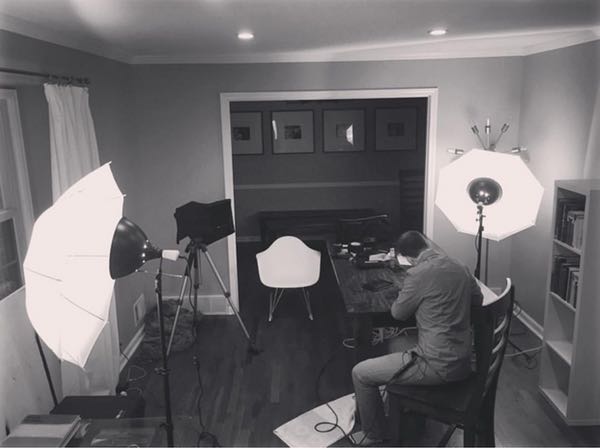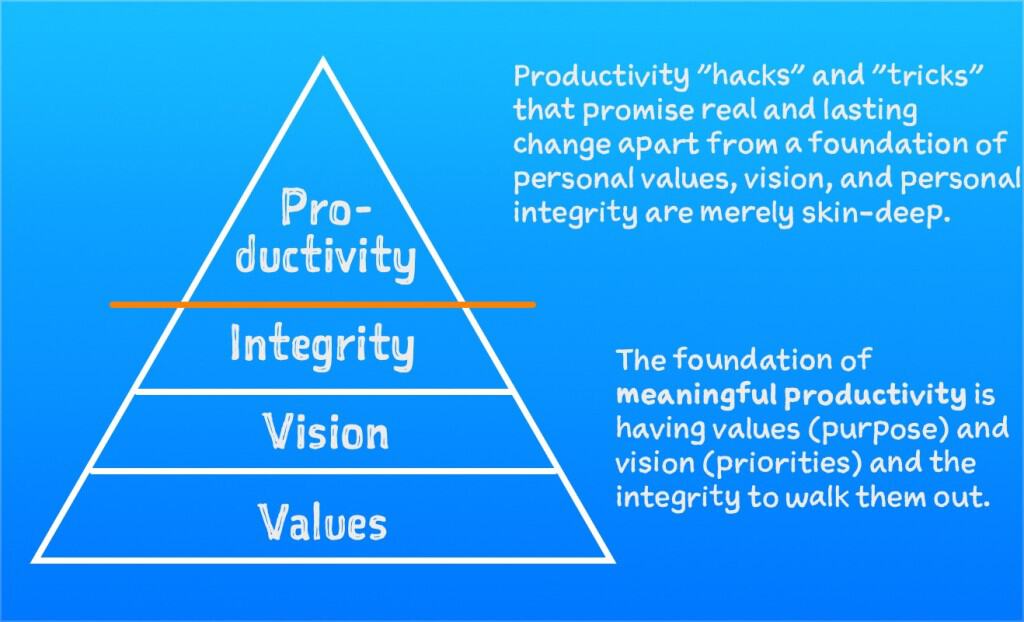A quick note: This is the second of a 2-part series on Margin. You can read Part 1 here.
In January, we’ll be going much more in-depth on this topic. There will be podcast interviews, resource recommendations, articles, and more.
That said, let’s talk about Margin…
* * *
Though they are related, Margin and Stress are not the same thing. A lack of margin can (and usually will) cause stress. Being overloaded and overwhelmed is usually what can lead to the pain of stress.
For example, when our schedule is filled beyond capacity, we feel the pain of our overloaded responsibilities, and we get stressed out trying to manage everything. When we are living beyond our financial means, we feel the pain of an unhealthy financial state, and we get stressed about money.
As I wrote in Part One of this introduction to Margin, when you’re feeling the pain of overwhelm, listen to it.
There can be two reasons for the stress you feel:
- It may be that life is telling you you’re margin-less.
- Or, sometimes that feeling of overwhelm is because you’re in a season of transition — you’re close to a breakthrough.
When it’s the former, you need to dial down and create some margin. So often, when we are in desperate need of margin in our lives, it has to be explained to us or by us. It’s not instinctual. So, if you’re feeling the pain of a margin-less life, make sure you’ve got some things in place so you can stay sane and healthy.
If, however, it’s the latter — if you’re on your way toward a breakthrough in your skills — you need help and the perseverance to press through.
Today, let’s talk about these two things. How to dial down when you’re overloaded, as well as how to persevere when you’re on the cusp of a breakthrough.
Dial Down and Get Yourself Some Margin
In his book, Margin, Richard Swenson writes that “to be healthy, we require margin in at least four areas: emotional energy, physical energy, time, and finances.”
If you’re feeling overloaded, I bet you could get one or two “quick wins” for your emotional energy, physical energy, time, or finances — little ways to give yourself some breathing room.
Start by taking inventory of where you’re spending the bulk of your time, money, and energy. (Not where you wish you were spending it, but where you’re actually spending it.)
What can be subtracted?
What can you do to give your schedule, your emotions, your mind, your body, and/or your finances some breathing room?
The low-hanging fruit and Quick Wins
Here are some suggestions for quick wins for you. These can help stop the bleeding. And, with a small victory, you can begin to get some momentum going in the direction you need.
Physical Energy
There are some very simple ways to help get your body active if you’re feeling underachieved and not physically strong. Get enough sleep at night (which probably means going to bed on time). Take a 30-minute walk most days. Eat less sugar.
Not to sound like your mother, but these things are easy to give up when life gets crazy. I know that for me, my daily workout is usually the first thing to go when I’m feeling overloaded. So I certainly need the reminder about just how important physical health is to doing my best creative work.
Emotional Energy
You need social support (community). And you probably could do with less Screen Time.
For the former, ask a friend or family member for support. Even if it’s just to let them know you’re feeling overloaded and you need to talk about it. Also, take a moment to give to someone by encouraging, helping, or supporting them.
For the latter, next time you feel the urge to check your Social Network of Choice when you have a down moment, consider opening up your journal or notes app instead and writing down something you’re thankful for.
See also this recent Tim Ferris podcast episode, The Magic of Mindfulness, the EntreLeadership podcast episode with Shawn Achor, and this article I put together on dialing down.
Time
You’re smart enough to know that you’ll never “find” time. You have to make it. If your schedule is full, the only option is to begin saying no to things. I’d start with television if you haven’t already. Then I’d start with taking an hour or two at the beginning of your week to plan how you’ll be spending your time over the next 7 days.
Finances
Cut something small and simple out of your budget. Start making coffee at home; stop ordering drinks and dessert at restaurants; sell your car to get rid of the payments and buy something less fancy for cash. These types of changes aren’t easy to make, but they’re a way of taking charge of your finances and learning to live within your means.
I’d also highly recommend you set up a rainy day fund if you don’t have one already. Save $1,000 as fast as you can. Figure out how to get an extra $34/day and you’ll have that $1,000 in less than a month.
See also this article I wrote last summer about working from home and running a business. In it I talk some more about financial health, physical health, and relational health for the creative entrepreneur.
Staying Sane In the Midst of a Busy or Challenging Season
If you’re in a particularly busy or challenging season of life, what you need is the ability to press through. If you’re on the edge of a breakthrough, keep going and get yourself to the other side of the complexity.
What do I mean by “on the edge of a breakthrough?”
When you’re learning something new or transitioning to a different season of life, you have to “break through” from where you were to get to where you’re going.
Perhaps it’s that you’re starting a new business. Or you’re learning PHP. Or you want to get better at budgeting. Or you’re writing a book. When you’re first starting out and you’re at the very outside of that new skill set, it doesn’t seem quite so scary. But then, once you begin making a little bit of progress, you realize just how much you don’t know, and that state can be overwhelming.
It feels overwhelming because you suddenly begin to see so many open ideas, moving parts, and hazy concepts. You can see everything moving around, but it’s all in a fog and doesn’t make sense yet. You have a ton of unanswered questions, and you don’t even know who to go to for help or what you would even ask them.
Basically, you’re in the midst of a heightened season of “deep work,” and it’s not easy.
Instead of quitting, keep on learning. Keep pushing through. Eventually, the fog will lift, the dots will connect, and you’ll get that breakthrough.
A few weeks ago, I wrote an article on how I stay sane when life is extra busy.
You want to make sure that as you’re persevering in your busy or challenging season, it’s not to the detriment your health and relationships.
Why take out all the fun of learning a new skill or starting a new business? It’s hard enough as it is without letting yourself become habitually sleep deprived and neglecting your closest relationships.
By all means, keep your sanity and your health! This will actually help you. It will give you more energy and strength to learn, and it will expedite the crazy season, and even make it more enjoyable.
Ensure that you are actually making progress every day and not just suffering under the weight of being busy. This will also help ensure that when the busy season is over, you don’t hit a wall and get sick or depressed.
When life is at its busiest, it’s all the more important to be overly diligent and intentional with how you spend your time.
Here are the ways I stay focused during especially busy or challenging seasons of life (such as the one I’m in right now, as a matter of fact):
- Making sure my day is filled with intentional work. Step one is knowing what to do and having a plan of when I’m going to do it. This is so important that I’ve actually been spending more time managing my time. The days can so quickly get away from me that I’m upping my intentionality to make sure my daily and weekly schedule is providing me with the time I need to do the most important work.
If I’m mostly in a reactive state — giving my attention primarily to the incoming inboxes of email and Twitter — then chances are I’m wasting time. This is why I’ve been spending even less time than usual on email and Twitter…
- Dialing back on social media. I love Twitter. It’s a great place for conversations, dialog, and finding cool stuff. But it’s not where I do my most important work.
-
My “Now” Page. This is something I picked up from Derek Sivers, who created a page on his website, simply titled “Now”. On there he listed out the few things he is most focused on. Not just work things, but life, hobbies, etc. It serves as a personal reminder to him about where he wants to be focusing his time as well as a public statement to others about what he’s doing (and what he’s not doing).
I love this idea. I’m a big proponent of what I call meaningful productivity, which just means you’re actually spending your time doing the things that you want to do. The problem is that most of us spend our time doing what we don’t want to do — usually just by default. We forget, we’re tired, or whatever, and so we just default into something (such as mindless email checking) that is not on our “now” list. The Now page can serve as a plumb line for you.
And the other cool thing about having a publicly available “Now” page is that it gives a sense of accountability. You’ve told the world what’s important to you and how you’re spending your time, and now you need to keep that commitment.
- Recognizing progress. This is huge. When you’re down in the thick of it, one of the best ways to keep your momentum going is to recognize and celebrate the progress you make each day. I use Day One because it’s awesome. And at the end of the day, I’ll write down the small wins from my day.
-
Health. This is the one that goes out the window the fastest for me, which is unfortunate because it’s also the one that matters the most. A good night’s sleep, a diet that gives you energy, and some regular out-and-about exercise is so good for you.
-
Date night, family time, and lunches with friends: Social support is one of the main ways to keep a healthy emotional state. It’s also one of the best ways to increase your baseline level of happiness and to help ensure a successful and satisfying career.
For me, when things get extra busy, the thing that next goes out the window is my time with friends. I’ll find myself wanting to cancel my standing lunches with friends, work late and infringe on family time, and even skip date night with my wife. All so I can work more hours.
While there are occasions here and there when I truly do need to work extra, they need to be the exception to the rule and not the default.
All these things come together to help give space to think, to breath, and to focus on doing what’s most important.
* * *
Thanks for reading! As I said, we’ll be diving more into this topic in January. In the mean time, I hope you’ll sign up for the free class I’m teaching. It starts in just a few days, and it’s going to be awesome!
And, in closing, here’s one more quote from Dr. Swenson:
Let’s stay busy to be sure. But together let’s also develop the necessary theological underpinnings for margin that will allow us to accept its importance without guilt. For just as we need to eat and sleep, so we also need to breathe.


